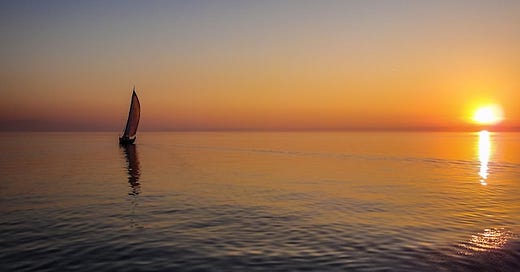Dear Reader,
It is a truth universally acknowledged that, more often than not, midlife comes with moments of deep reckoning. When we realize that things did not turn out the way we hoped or planned for, we start harboring doubts about our ability to make sound judgments and end up questioning our choices: Did I trust and follow my intuition on important matters in life? Were my decisions aligned with my inner self or did I place more importance on societal values and norms? Were my actions consistent with my true beliefs? As is often the case, our inner critic confirms our doubts, reminding us that we did not pursue our goals as fiercely as we could have, having abandoned ourselves and our dreams in the process.
In “The Grievance,” a poem bristling with emotional anguish, Odysseus Elytis (1911 – 1996), the critically acclaimed and Nobel Prize-winning Greek poet, ruminates on his life’s journey, coming to terms with the fact that the life he led was not the one he had initially intended for himself. It is a powerful declaration that acknowledges the passing of time and the tragedy of experiencing life as if carried by an outside force to find ourselves embedded in a (physical and emotional) place we barely recognize.
The Grievance (also translated as “The Complaint”) is included in Elytis’ Greek poetry collection “The Rhos of Eros.” Of all the English versions available, the one that follows remains truest to its essence and conveys its meaning as smoothly as the original:
The Grievance
By Odysseus Elytis
Here, half way along the trail
the time has come for me to say it
I love other things
I started out for elsewhere.
Truthfully and half-truthfully
I say and admit it
As though I were someone else and not I
I made my way through life.
As cautious as one may be
As much as he pursues it,
Always, always, it will be too late
There is no second life.
Yes, there is no second go at life. And yet, we still have time. Instead of hiding in our burrows, licking our wounds, we can decide to do our best with our remaining days. In “Tiny Beautiful Things,” one of the most life-changing and life-affirming books I have read and have had the luck to translate into Greek,
answers a reader’s dilemma of whether or not to procreate. In her answer, which applies to any decision in life, the sympathizing columnist refers to “The Blue House,” a poem by Tomas Tranströmer about our possible alternative lives and how they can haunt us forever, always finding ourselves contemplating the “what ifs,” lingering on the trains we did not catch and the roads we did not take. After all, with every decision, we create a new reality: every action we take irrevocably alters our present, which serves as a starting point for new decisions, one step leading to another without ever having the possibility to return intact to a prior crossroad because every choice changes us from within.Nostalgia for our potential lives has plagued the human condition the world around for centuries, inspiring great works and creative expression. As a starting point, the exquisite books below offer more insight into the subject:
For the philosophical-minded, Kieran Setiya provides a historical overview of the so-called “midlife crisis” as well as applicable advice on how to live more in the now (Life Is Hard is another excellent book by the same author)
On Not Being Someone Else: Tales of Our Unled Lives by Andrew H. Miller
A terrific mosaic of literary and philosophical segments drawing on diverse writers and thinkers from earlier centuries till our days.
The Midnight Library, by Matt Haig
A life-affirming novel against regret.
Why We Can't Sleep: Women's New Midlife Crisis, by Ada Calhoun
Today’s women have an especially hard time navigating disappointment during midlife; in her book, Ada Calhoun provides socio-economic reasons and practical steps on mapping out a better way forward.
Decision-making is an important life skill, yet we often fail at it. Despite (seemingly) endless opportunities to shape our destiny and move forth on an intentional path, a sense of disappointment engulfs us when we sense that we have made the wrong decisions and choices. Other times, events outside of our control change the course of our lives, moving us away from our desires. But instead of indulging in contemplation and doubt of possible alternative lives, we can make the choice that from this point onwards, our intentions and decisions are made in good faith, honoring our truth. After all, in the wise words of
:You don’t have a right to the cards you believe you should have been dealt. You have an obligation to play the hell out of the ones you’re holding. And dear one, you and I both were granted a mighty generous hand.
Thank you for reading.
Katerina
P.S.: Odysseus Elytis (né Alepoudelis) was born in 1911 on the Greek island of Crete and is often dubbed as the poet of the Aegean, as his body of work is said to emit the sunlight and sea breeze of the Greek sea. To acquaint yourself with Elytis’ work in English, you can start by reading The Axion Esti, Odysseus Elytis: Selected Poems and Sovereign Sun, accompanied by his 1979 Nobel acceptance speech in which he spoke “in the name of luminosity and transparency”.
P.S.: If you haven’t already, pick up the tenth-anniversary edition of Tiny Beautiful Things and watch the adapted series on Hulu.





